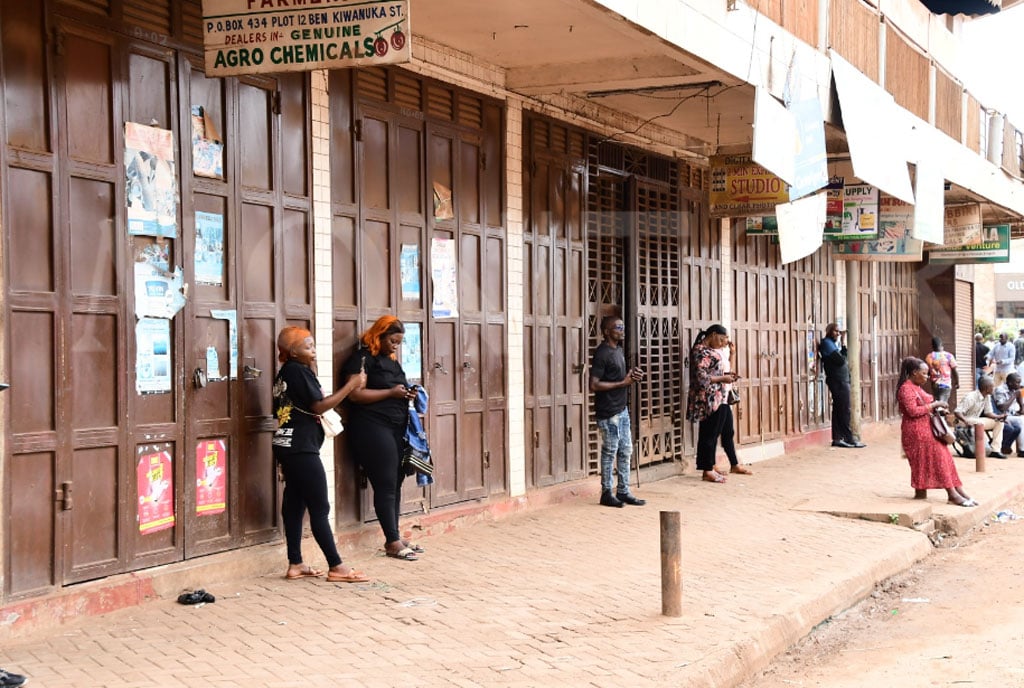Courts paralysed as judicial officers strike

Some of the litigansts stranded at the entrance of Tororo Chief Magistrates Court. Photo by Fred Wambede
KAMPALA- Litigants were on Friday stranded at different courts countrywide as judicial officers went on strike citing “unresolved welfare issues” by the government.
At Anti-Corruption Court in Kololo, a session aborted and prison officers were forced to return inmates back to Luzira Prison by 10.30am without getting dates for the next hearing of their cases. It was a similar situation at City Hall and Buganda Road courts.
At the Supreme Court in Kololo, the Court is on vacation but justices were in their chambers by 10.30am while Buganda Road courtrooms and holding cells remained locked.
At Buganda Road Magistrates Court, twenty cases had been cause listed but could not go on. The registry remained open.
The situation was not different in other courts around the country. Masaka High Court remained closed and some lawyers who turned up for sessions castigated strike judicial officers for staying away from works stations despite the case backlog.
“I wish they also test the same wrath when they go to hospitals with urgent need and find nurses on strike,” one of the lawyers said before driving away.
Other courts that had no activity include Buwama in Mpigi District and courts in Soroti and Busia districts.
At Lira High Court, suspects were returned to prison while those who were brought from police stations were released after getting police bond.
In Mbarara, courtrooms and offices remained closed apart from that of the deputy registrar, Ms Susan Abinyo, who declined to talk to journalists.
At Mbale High Court, office supervisor, Mr Martin Sikhukhu said that over 50 cases that were supposed to be handled by different judicial officers, both in the High Court and Magistrates Court were affected.
“Some cases were scheduled for judgment, others for hearing there is no case moving until they [judicial officer] call off the strike,” said Mr Sikhukhu adding that prisoners from Malukhu Prison were returned to jail.
In Tororo, litigants who had showed up by 8am were turned away by security officers.
“I was instructed not to allow anyone into the court compound because court sessions will not take place,” said one of the security officers, who preferred anonymity.

Mbale Chief Magistrates Court remained closed on Friday. Photo by Fred Wambede
In Manafwa District, the chief magistrate’s court remained empty with few supporting staff.
Mr Robert Magomu, a litigant, said he was disappointed because his case judgement was scheduled for Friday.
“I am so much disappointed. Now I do not know when the judgement will be rescheduled,” he said.
In Sironko, litigants were seen pondering the next move after getting information that judicial officers were striking over pay.

At Jinja Magistrates Court, court rooms were locked. Photo by Tausi Nakato
In July this year, judicial officers under the Uganda Judicial Officers Association voted to lay down their tools by August 23.
More than 400 judicial officers want government to increase their salary, give them vehicles to enhance land justice, be given medical insurance, housing allowance and security guards.
Prisons affected
Mr Frank Baine, the spokesperson of the Uganda Prison Service described the strike as a crisis as far as his institution is concerned.
According to Mr Baine, on average 1,500 inmates go to court on a daily basis but with the strike, they will not be attended to.
“About 500 get released by courts and about 500 to 600 get in every day. If this strike lasts for a week, we shall get enormous inflow when court operations resume with about 2,000 suspects coming within a day,” he said. This will make our work very hard and you know that justice delayed is justice denied.”
Judiciary’s take
In the circular dated August 24, 2017, the Chief Registrar Gadenya Paul Wolimbwa said that the Judicial Service Commission, a body mandated to advise government on terms and conditions of service of judicial officers is working on a revised submission on the matter.
“Furthermore, a petition has been lodged in the Constitutional Court on the same issues over which industrial action is being contemplated. There were three courses of action that had suggested; negotiation, legal action and industrial action. Industrial action would be the last course of action if all the action failed,” Mr Wolimbwa wrote.
Mr Solomon Muyita, the senior communications officer of Judiciary said most of the courts countrywide are affected except some mediation sessions in court chambers in Kampala.
“Our position is simple. Just like the Chief Registrar and secretary to the JSC wrote to members of UJOA this week, all the avenues to resolve this matter have not been fully exhausted,” he said.
He added: “The window for negotiation is still open, we know the president has agreed to meet the Chief Justice and the Speaker of Parliament on September 8 about the matter and after that the president has indicated that he will meet all the judicial officers and he is equally concerned that the welfare issues of judicial officers need to be addressed.”
Earlier, Chief Justice Bart Katureebe who is also the patron of UJOA said that it would be premature to go for the last course of action.
Justice Katureebe had appealed to the judicial officers to “remain calm, steadfast and committed to duty” as the judiciary as issues of the remuneration are being handled.
Reported by Ephraim Kasozi, Jalira Namyalo, Betty Ndagire, Ruth Anderah, Sadat Mbogo, Felix Ainebyona, Ssekweyama, Philip Wafula & Isaac Otwii, Fred Wambede, Joseph Omollo, Micheal Waniola and Julius Ocungi.




